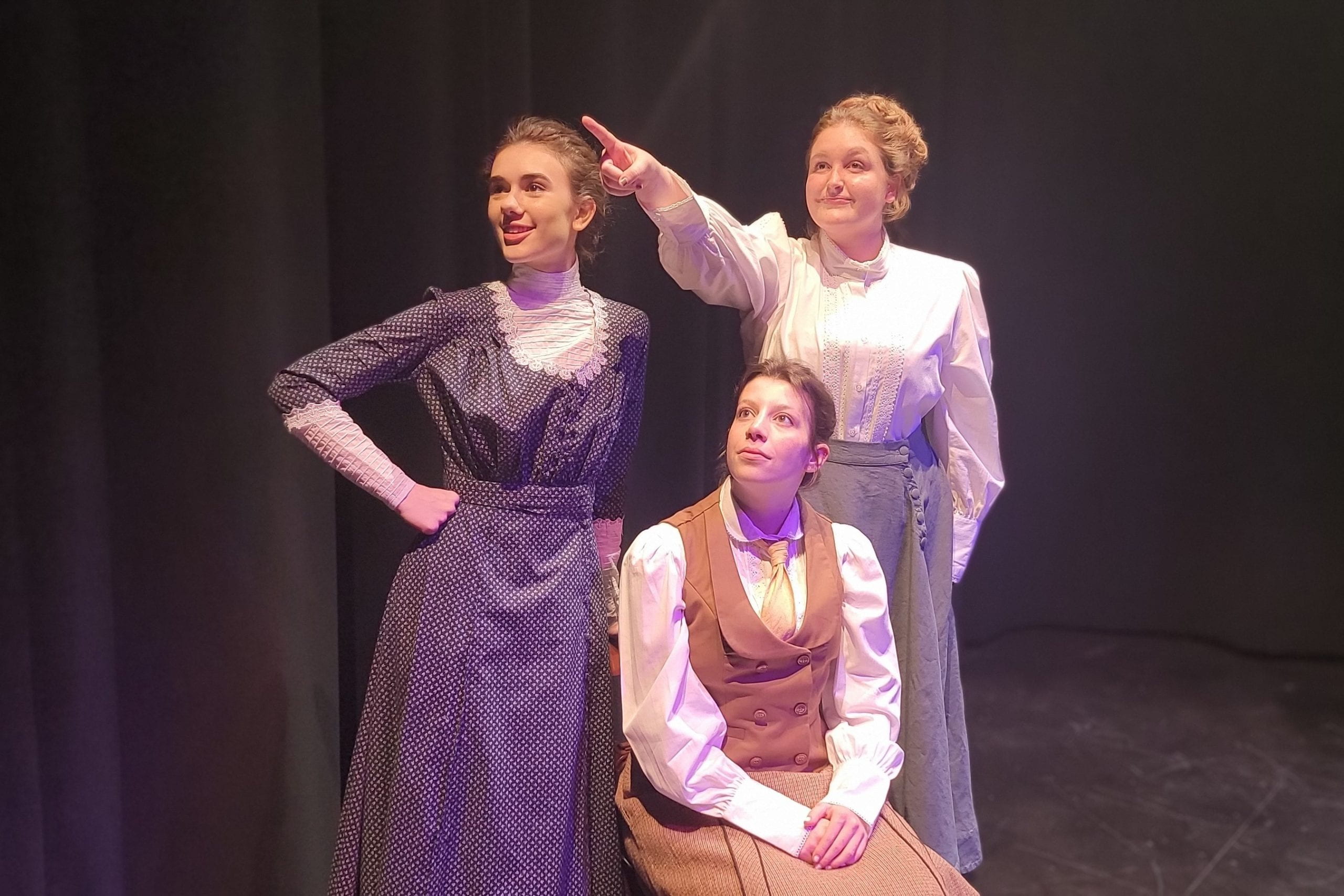
(From left to right) Marta Minarik as Williamina Fleming, Hailey Zitzer as Annie Cannon and Gabriella Johnson as Henrietta Leavitt in the Department of Theatre, Film, and Media Arts’ production of “Silent Sky.” Credit: J. Briggs Cormier
Art and science are two multilayered, powerful areas of learning that can often be difficult to blend together.
Opening on Wednesday, the Ohio State Department of Theatre, Film, and Media Arts’ production of “Silent Sky” will endeavor to integrate astronomical concepts into a theatrical production. The play, set in the early 1900s, dramatizes the life and career of American astronomer Henrietta Leavitt, the department’s website states.
Gabriella Johnson, a fourth-year in social work and the actress playing Leavitt, said the show’s cast and crew have conducted thorough background research to fully comprehend the script’s scientific implications. In turn, Johnson said this research has helped them appreciate Leavitt’s innovative mind more than ever.
“All the work that goes into scientific discoveries is very similar to the process of working on a project in theater or any art really, spending hours and hours and years,” Johnson said.
As a lifelong astronomy buff, Johnson said portraying Leavitt has been a highly rewarding experience.
“Henrietta Leavitt was one of my idols growing up as a kid,” Johnson said. “It’s very full circle for me to be able to play this character and get to tell this story.”
Johnson said “Silent Sky” is a notable production because it brings more attention and acclaim to hardworking astronomers whose stories have been overlooked for decades.
“When you learn about [Leavitt’s] discovery in astronomy, it’s not called Henrietta’s law,” Johnson said. “A lot of other things in astronomy, physics and most of the sciences, you can find those laws and those theories tie back to the person that discovered them. So she’s kind of an unsung hero, which I think makes the story even more important. And not even just her, but the other astronomers, too.”
Two of those “other astronomers,” Annie Jump Cannon and Williamina Fleming, are likewise undervalued trailblazers in the field of celestial science, Johnson said.
Sarah Cole, a second-year theater studies graduate student and the production’s dramaturg — meaning she aids the cast and crew in understanding the play’s historical context, intended themes and more — said these women often persevered through misogyny and its negative effects.
“They only got paid 25 cents per hour for their work and they were not appreciated,” Cole said. “There was a lot of sexism and power imbalances in the workplace that these women struggled through, but [they] still were devoted to their work and to finding these larger answers.”
Cole said the play will present multiple versions of “femininity,” challenging its viewers to recognize each one as distinctly compelling and worthwhile.
“Henrietta’s sister Margaret represents more of a traditional role of a woman at that time,” Cole said. “She’s at home on the homestead, she gets married, she has kids, she’s really devoted to religion and her church and so, Margaret is really this picture of domesticity compared to Henrietta.”
Even though women drive the show’s plot, Cole said the singular male character — named Peter Shaw — is important as well. She said Shaw is not modeled after a specific person but rather serves as a fictional embodiment of early-20th-century masculinity.
“His character is fascinating because we see him kind of grapple with how these women and their breaking of these traditions makes him uncomfortable and challenges him,” Cole said. “Henrietta’s brilliant mind becomes really attractive to him and something that he doesn’t fully understand.”
Cole said playwright Lauren Gunderson, who penned “Silent Sky,” frequently writes plays that address women’s undervalued presence(s) across history.
“Gunderson says that these stories are fascinating to tell, but they’re much more interesting through the lens of women because women have had to struggle through these inequalities,” Cole said. “Gunderson is also interested in the intersection between the arts and sciences, and how to use the arts to tell the story of the sciences.”
Telling a story that is normally excluded from mainstream education has been an invigorating privilege, Cole said.
“I’m proud of our student actors, and their [grasp of] this fun and challenging material,” Cole said. “To play these characters that are real historical figures and to do that justice is a big challenge, and these actors have brought so much life to these characters. It’s just fun to watch.”
“Silent Sky” will be performed at the Department of Theatre, Film, and Media Arts’ Blackbox Theatre on select dates from Wednesday to March 8. More information, including how to purchase tickets for the show, can be found on the department’s website.


